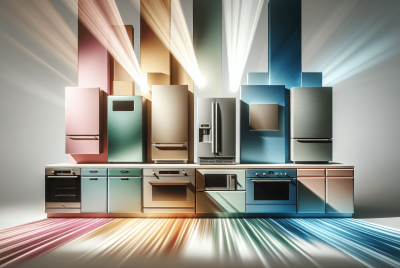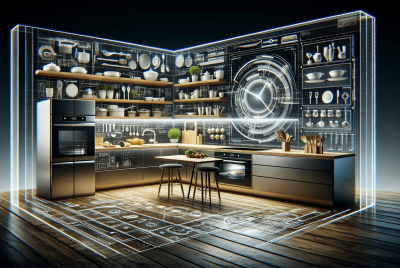What Is The Future Of Technology In Kitchens?
Picture a world where technology seamlessly integrates into your kitchen, transforming it into a futuristic hub of culinary innovation. From smart appliances that anticipate your needs to virtual assistants that guide you through recipes step by step, the future of technology in kitchens holds endless possibilities. Imagine a refrigerator that tracks and orders groceries when you’re running low, or a countertop that doubles as a touchscreen recipe book. With technology advancing at an exponential rate, the kitchen of tomorrow is not only efficient and time-saving but also a delightful and interactive space where cooking becomes an even more creative and enjoyable experience.

Smart Appliances
In the future, technology is expected to revolutionize the way we cook and interact with our kitchen appliances. Smart appliances, also known as internet-connected devices, will become more prevalent and allow you to have greater control and convenience in the kitchen. These appliances can be controlled remotely using your smartphone or voice commands, making your cooking experience seamless and effortless.
Internet-connected devices
With internet-connected devices in your kitchen, you can stay connected and informed about your appliances, even when you’re not at home. Imagine being able to preheat your oven on your way back from work or receive notifications when your dishwasher cycle is complete. These devices will bring a new level of convenience and efficiency to your daily cooking routine.
Voice-controlled features
Gone are the days of manually adjusting temperature settings or timers on your appliances. Voice-controlled features will enable you to command your appliances with simple voice commands. Just imagine saying, “Preheat the oven to 375 degrees” or “Start a pot of coffee” and having your appliances respond accordingly. This hands-free approach to controlling your appliances will make cooking more accessible, especially for those with physical disabilities or limited mobility.
Smart refrigerators
Smart refrigerators will revolutionize the way we store and manage our food. These appliances will have built-in cameras that allow you to see the contents of your fridge remotely, ensuring you never forget to pick up milk on your way home. Additionally, they can track expiration dates, suggest recipes based on ingredients, and even order groceries for you when supplies run low. Smart refrigerators will streamline the way we shop, plan meals, and reduce food waste.
Smart ovens
Imagine having an oven that knows the perfect cooking time and temperature for every dish you prepare. Smart ovens will have sensors that automatically detect the type and quantity of food you place inside, adjusting the cooking parameters accordingly. With precision temperature control and personalized cooking settings, your meals will turn out perfectly cooked every time. Smart ovens will also be able to provide recipe suggestions and guide you through the cooking process, making it easier to try new recipes and experiment in the kitchen.
Automated Cooking Processes
The future of technology in kitchens goes beyond connected appliances. With automated cooking processes, you’ll have access to robot chefs and appliances that can plan meals and clean up after themselves.
Robot chefs
Say goodbye to long hours spent chopping vegetables or stirring pots on the stove. Robot chefs will take over these labor-intensive tasks and free up your time for more enjoyable activities. These automated kitchen assistants will be programmed to perform tasks like chopping, stirring, and sautéing, allowing you to focus on the creative aspects of cooking. They will follow recipes with precision, ensuring consistent results every time.
Automated meal planning
Planning meals can often be a time-consuming and tedious task. However, with automated meal planning, technology will simplify this process for you. Imagine having an app or device that suggests recipes based on the ingredients you have on hand, your dietary preferences, and nutritional needs. This technology will save you time and make it easier to create balanced and diverse menus. It can even generate shopping lists and order groceries for you, making meal planning a breeze.
Self-cleaning appliances
Cleaning up after cooking can sometimes feel like a daunting chore. However, with self-cleaning appliances, this task will become effortless. Appliances equipped with self-cleaning capabilities will automatically clean themselves after use, saving you time and effort. For example, self-cleaning stoves can incinerate food residue, while dishwashers can have self-dispensing detergent and water monitoring systems. These appliances will ensure a cleaner and more hygienic kitchen environment while minimizing your cleaning workload.
Energy Efficiency
Technology in kitchens will also contribute to a more sustainable and energy-efficient future. Smart lighting systems, energy-saving appliances, and solar-powered kitchens are some of the advancements that will enhance energy efficiency in our homes.
Smart lighting systems
Smart lighting systems will use motion sensors and ambient light detection to optimize energy usage in the kitchen. These systems will automatically adjust lighting levels based on natural light availability and occupancy in the room. LED lights, known for their energy efficiency, will also be widely used in smart lighting systems. By optimizing energy consumption, smart lighting systems will reduce electricity costs and minimize our environmental footprint.
Energy-saving appliances
Appliances with energy-saving features will become the norm in the future kitchen. These appliances will be designed to minimize energy usage without compromising performance. Advanced insulation, efficient cooling systems, and optimized power usage will be incorporated into these appliances, saving energy and reducing electricity bills. For example, smart dishwashers will have sensors that detect the load size and adjust water usage accordingly, reducing both energy and water waste.
Solar-powered kitchens
Solar power is a clean and renewable energy source that will play a significant role in the kitchens of the future. Solar panels installed on rooftops or walls will provide electricity to power various kitchen appliances. This environmentally-friendly solution will reduce dependency on non-renewable energy sources and lower carbon emissions. Solar-powered kitchens will not only save money on utility bills but also contribute to a more sustainable future.

Augmented Reality in Meal Preparation
With advancements in technology, augmented reality (AR) will revolutionize the way we prepare meals. AR recipe guides, virtual kitchen assistants, and interactive cooking experiences will bring a new level of creativity and convenience to your culinary adventures.
AR recipe guides
AR recipe guides will overlay digital instructions and information onto the real-world view of your kitchen. These guides can be accessed through smartphones, tablets, or AR glasses, providing step-by-step instructions and visual cues directly in front of you. Whether you’re a novice cook or an experienced chef, AR recipe guides will make it easier to follow recipes and ensure accurate measurements and cooking techniques.
Virtual kitchen assistants
Virtual kitchen assistants will bring the expertise of a professional chef into your home. These assistants will provide real-time guidance and support as you cook, answering your questions and offering helpful tips along the way. With voice commands and interactive displays, you’ll be able to ask for recipe recommendations, nutritional information, and cooking techniques. Virtual kitchen assistants will enhance your cooking skills and make meal preparation more enjoyable.
Interactive cooking experiences
Immerse yourself in interactive cooking experiences with the help of augmented reality. Imagine virtually exploring a farmers’ market, selecting fresh produce, and then using AR to see how different ingredients can be combined to create delicious dishes. AR will enable you to experiment with flavors, textures, and cooking methods, providing a truly interactive and personalized cooking experience. From virtual cooking classes to interactive recipe demonstrations, the possibilities are endless with AR in meal preparation.
Customized Food and Beverage Delivery
The future of technology in kitchens extends beyond the cooking process itself. With customized food and beverage delivery, you’ll have access to automated grocery ordering, personalized meal kits, and smart delivery systems.
Automated grocery ordering
Gone are the days of manually creating shopping lists and visiting grocery stores. Automated grocery ordering systems will streamline the process by tracking your inventory, suggesting items to replenish, and placing orders for you. These systems will use data from smart refrigerators and pantry sensors to determine your needs and preferences. With automated grocery ordering, you’ll save time, reduce food waste, and ensure your kitchen is always stocked with your favorite ingredients.
Personalized meal kits
Meal kits have gained popularity in recent years, offering convenience and variety to home cooks. In the future, technology will take personalized meal kits to the next level. By analyzing your dietary preferences, nutritional needs, and cooking abilities, technology will curate customized meal kits tailored to your taste and lifestyle. These kits will come with pre-portioned ingredients and step-by-step recipe instructions, making it easier than ever to prepare delicious meals at home.
Smart delivery systems
Imagine smart delivery systems that can securely deliver groceries, meals, and beverages right to your doorstep. These systems will utilize autonomous delivery vehicles, drones, or even robots to ensure swift and efficient delivery. Through smartphone apps or smart home integration, you’ll be able to track the progress of your delivery in real-time and even provide instructions for where to leave the items. Smart delivery systems will enhance convenience, reduce delivery times, and eliminate the need for unnecessary trips to the store.
Advancements in Food Preservation
Preserving food and extending shelf life is a constant challenge in every kitchen. However, future technologies will offer innovative solutions to enhance food preservation, ensuring that perishable items last longer and reduce food waste.
Smart food storage solutions
Smart food storage solutions will utilize sensors and automated controls to maintain optimal conditions for food preservation. These storage solutions will monitor temperature, humidity, and air quality to ensure that perishable items stay fresh for longer. Additionally, they can provide real-time alerts if the temperature or humidity levels deviate from the desired range, allowing you to take immediate action. With smart food storage solutions, you’ll have peace of mind knowing that your food will stay fresh and flavorful.
Precision temperature control
Temperature control is crucial for preserving food, and future technologies will offer precise control over temperature settings. Appliances like refrigerators and freezers will have advanced temperature sensors and cooling systems to maintain the ideal conditions for different types of food. For example, delicate fruits and vegetables may require slightly higher temperatures, while meat and dairy products need lower temperatures. With precision temperature control, you’ll be able to maximize the shelf life of your groceries and minimize food waste.
Longer shelf life for perishables
Innovations in packaging materials and preservation techniques will extend the shelf life of perishable items. For example, advanced packaging technologies may utilize modified atmosphere packaging, which replaces oxygen with gases that slow down spoilage. By reducing oxygen exposure, the growth of bacteria and mold can be inhibited, increasing the shelf life of fruits, vegetables, and other perishables. Longer shelf life will reduce food waste, allowing you to enjoy fresh produce for longer and save money on grocery bills.
Health and Wellness
The future of technology in kitchens will also have a significant impact on our health and wellness. From smart nutrition tracking to innovative cooking techniques, technology will empower us to make healthier choices and customize our diets.
Smart nutrition tracking
Monitoring your nutritional intake will become easier and more accurate with smart nutrition tracking technology. Smart appliances, wearables, or smartphone apps will help you track the nutritional content of the ingredients you use, the portion sizes, and the overall balance of your meals. This data can be analyzed to provide insights into your dietary habits, identify potential deficiencies, and suggest healthier alternatives. With smart nutrition tracking, you’ll have a comprehensive understanding of your diet and the ability to make informed choices.
Innovative cooking techniques
Technology will introduce innovative cooking techniques that prioritize healthy and nutritious food preparation. For example, steam ovens will become more common, enabling you to retain more vitamins and minerals in your cooked meals. Sous vide cooking, which involves vacuum-sealing food and cooking it in a precisely controlled water bath, will also gain popularity for its ability to preserve nutrients and enhance flavors. These innovative cooking techniques will allow you to maintain a healthier diet without compromising taste or convenience.
Personalized diets and meal plans
Personalized diets and meal plans will be tailored to your individual nutritional needs and health goals. Advanced algorithms and machine learning will analyze your biometric data, dietary preferences, and health conditions to create customized meal plans. These plans will take into account your recommended daily intake of nutrients, allergies, and intolerances, ensuring that every meal meets your specific requirements. By following personalized diets and meal plans, you’ll be able to optimize your nutrition and achieve your health goals more effectively.
Internet of Things Integration
The future of technology in kitchens lies in the integration of various devices and appliances through the Internet of Things (IoT). Connected kitchen ecosystems, smart home integration, and data-driven insights will enhance convenience and efficiency in the kitchen.
Connected kitchen ecosystem
A connected kitchen ecosystem will allow seamless communication and coordination between different appliances and devices in your kitchen. For example, your smart refrigerator can notify your oven about the ingredients you have, enabling it to suggest recipes or adjust cooking settings accordingly. Connected kitchen ecosystems will optimize energy usage, streamline cooking processes, and enhance the overall functionality of your kitchen.
Smart home integration
Integrating your kitchen appliances with your smart home system will offer a new level of convenience and control. Through voice commands or smartphone apps, you’ll be able to control and monitor your appliances from anywhere in your home. For example, you can preheat your oven while relaxing in your living room or receive notifications when your dishwasher cycle is complete. Smart home integration will transform your kitchen into a central hub of your smart home, where all your devices work together seamlessly.
Data-driven insights
The vast amount of data generated by connected kitchen appliances will provide valuable insights into your cooking habits, food consumption, and overall kitchen efficiency. Machine learning and artificial intelligence algorithms will analyze this data to provide personalized recommendations, optimize energy usage, and identify areas for improvement. For example, algorithms can suggest recipes based on your preferences and the ingredients you have, help you reduce food waste, or identify appliance maintenance needs. Data-driven insights will enhance your cooking experience, empower you to make informed decisions, and contribute to a more sustainable kitchen environment.
Sustainable Practices
Promoting sustainability is a crucial aspect of the future of technology in kitchens. With a focus on reducing food waste, using renewable materials, and implementing smart farming technologies, kitchens will become more environmentally-friendly.
Reducing food waste
Technology will play a significant role in reducing food waste, both at home and in the food industry. Smart refrigerators and pantry sensors will track expiration dates, send notifications when items are nearing their expiry, and suggest recipes to use up ingredients before they spoil. Automated grocery ordering systems will ensure that you buy only what you need, minimizing food waste due to over-purchasing. By reducing food waste, we can conserve resources and help combat global hunger.
Using renewable materials
The materials used in kitchen appliances and packaging will shift towards sustainability. Renewable materials, such as bioplastics made from plant-based sources, will replace traditional petroleum-based plastics. These materials are biodegradable, reducing their impact on the environment. Additionally, sustainable alternatives like bamboo or reclaimed wood will be used for kitchen furniture and utensils. By using renewable materials in the kitchen, we can minimize waste and contribute to a more sustainable future.
Smart farming technologies
The future of technology in kitchens extends far beyond our homes. Smart farming technologies will revolutionize the way we produce and access food. Vertical farming, hydroponics, and aquaponics systems will allow us to grow fresh produce in urban environments, eliminating the need for long-distance transportation and reducing carbon emissions. These smart farming technologies use fewer resources, such as water and fertilizers, while maximizing crop yields. By integrating smart farming practices into our food production systems, we can create a more sustainable and resilient food supply chain.
Enhanced Safety Features
Safety in the kitchen is of utmost importance, and future technologies will offer enhanced safety features to protect you and your loved ones from potential hazards.
Fire and hazard detection
Advanced fire and hazard detection systems will provide early warnings and automatic responses to potential kitchen emergencies. Smart smoke detectors with built-in sensors can quickly detect smoke or sudden changes in temperature, triggering alarms and notifying emergency services if necessary. Additionally, smart appliances will be equipped with safety features that automatically shut off in the event of a malfunction or overheating. These advancements will minimize the risk of fire and other hazards, ensuring a safer cooking environment.
Smart kitchen monitoring
Smart kitchen monitoring systems will utilize cameras and sensors to monitor various aspects of your kitchen environment. These systems can detect leaks, gas levels, and even air quality, providing real-time alerts to mitigate potential dangers. For example, if a gas leak is detected, the system can automatically shut off the gas supply and notify you. Smart kitchen monitoring will give you peace of mind, knowing that potential safety risks are constantly being monitored and addressed.
Automated emergency response
In the event of an emergency, automated emergency response systems will provide immediate assistance. With the integration of smart home systems, emergency response protocols can be triggered automatically, notifying emergency services and your designated contact list. For example, in case of a fire, the system can activate sprinklers, turn off the power supply, and unlock doors for easy evacuation. Automated emergency response systems will ensure quick and effective action during critical situations, keeping you and your loved ones safe.
In conclusion, the future of technology in kitchens is bright and promising. From smart appliances to automated cooking processes, energy efficiency to augmented reality, and customized food delivery to advancements in food preservation, technology will transform the way we cook, eat, and live. With a focus on health, sustainability, convenience, and safety, these advancements will enhance our cooking experience and contribute to a more efficient and sustainable future. Embrace the possibilities and get ready to experience the kitchen of tomorrow!



